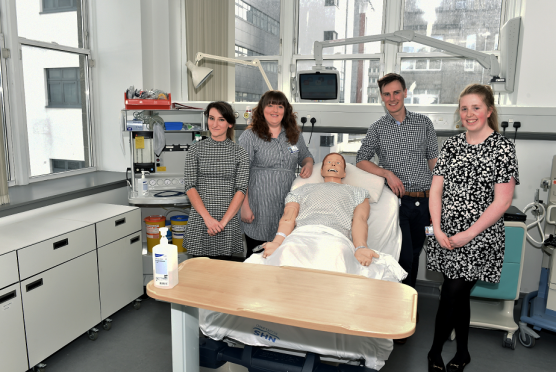NHS Grampian will offer graduates of a controversial medical course guaranteed jobs as part of efforts to ease its recruitment crisis.
Aberdeen University pioneered the training of physician associates (PAs) in Scotland – and 18 people are already employed in the role by the board.
Now it hopes the promise of work will mean more of the 15 who complete the two-year course each year will stay in the north-east.
Last year, NHS Grampian spent more than £1million on locum staff in its surgical departments between April and September.
PAs are able to perform many tasks usually performed by doctors, such as the diagnosis of certain illnesses, analysing test results and more.
Proponents say they fill an important role in reducing the workload of their senior staff and helping to improve patient flow in busy hospitals.
However critics say they are doing jobs that should really be performed by doctors.
A patients’ watchdog said it recognised some doctors would be “extremely angry” about the increased use of PAs but that any measure that improved the creaking NHS system had to be considered.
The PA role was first incorporated into NHS Grampian in 2013 and the board currently employs 18 in its general surgery, orthopaedics, emergency medicine and respiratory medicine wards.
It is hoped the new incentive will increase that number significantly.
Annie Ingram, director of workforce at NHS Grampian, said: “While PAs are not doctors, they are able to do many of the things junior doctors can.
“They work under the direct supervision of a named doctor, and are trained to take medical histories, perform examinations, diagnose some illnesses, analyse test results and help develop care management plans.
“That assistance helps ease workloads and allows doctors to focus their attention where it is needed most.”
Jamie Weir, a retired NHS Grampian board member and spokesman for the patient care group PACT, said: “I know some doctors will be extremely angry that this is happening because they feel that it should be done by doctors properly trained to do the job, but because of the problems of the NHS and particularly in Grampian, we have to look at different methods of being able to cope with what us as patients demand, and that is a reasonable health service.
“If you look at the statistics as far as Scotland is concerned, we have something like 4,000 doctors across the whole of Scotland, but if you took the equivalent population that would be about 5,000 in France, and if you took the equivalent population in Germany it would be about 9,000.
“We just do not train enough people to work in the health service, it’s as straightforward as that.
“But, if this new initiative does help recruitment to Grampian, and decreases waiting times, and improves patient throughput, then that has to be really applauded, and there’s no question about that.”
Dr Richard Coleman, associate medical director at the health board, said PAs carry out vital work at NHS Grampian.
“Since we employed our first PA in 2013, the role has continued to gather momentum throughout the country and there are now a number of health boards utilising the role, and between 250 and 500 working in the UK,|” he said.
“We are proud to be at the forefront of developing this new clinical profession and hopefully the guarantee of employment upon completion of the University of Aberdeen Course – as well as the student bursaries in exchange for a two year commitment to working in Grampian – will prove attractive.”
